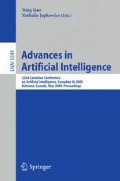Abstract
This paper shows that a detailed, although non-emotional, description of event or an action can be a reliable source for learning opinions. Empirical results illustrate the practical utility of our approach and its competitiveness in comparison with previously used methods.
Parts of this research were supported by NSERC funds available to both authors.
Access this chapter
Tax calculation will be finalised at checkout
Purchases are for personal use only
Preview
Unable to display preview. Download preview PDF.
References
Benamara, F., Cesarano, C., Picariello, A., Reforgiato, D., Subrahmanian, V.: Sentiment analysis: Adjectives and adverbs are better than the adjectives alone. In: Proceedings of ICWSM 2007, pp. 43–50 (2007)
Biber, D., Johansson, S., Leech, G., Conrad, S., Finegan, E.: Longman Grammar of Spoken and Written English. Longman (1999)
Hu, M., Liu, B.: Mining and summarizing customer reviews. In: Proceedings of the KDD 2004, pp. 168–177 (2004)
Reinratz, T.: Focusing Solutions for Data Mining. Springer, Heidelberg (1999)
Sokolova, M., Lapalme, G.: Verbs Speak Loud: Verb Categories in Learning Polarity and Strength of Opinions. In: Bergler, S. (ed.) Canadian AI 2009. LNCS, vol. 5032, pp. 320–331. Springer, Heidelberg (2008)
Sokolova, M., Szpakowicz, S.: Machine Learning Application in Mega-Text Processing. In: Soria, E., Martin, J., Magdalena, R., Martinez, M., Serrano, A. (eds.) Handbook of Research on Machine Learning Applications, IGI Global (2009)
Turney, P.: Thumbs Up or Thumbs Down? Semantic Orientation Applied to Unsupervised Classification of Reviews. In: Proceedings of ACL 2002, pp. 417-424 (2002)
Wilson, T., Wiebe, J., Hwa, R.: Recognizing strong and weak opinion clauses. Computational Intelligence 22(2), 73–99 (2006)
Author information
Authors and Affiliations
Editor information
Editors and Affiliations
Rights and permissions
Copyright information
© 2009 Springer-Verlag Berlin Heidelberg
About this paper
Cite this paper
Sokolova, M., Lapalme, G. (2009). Opinion Learning without Emotional Words. In: Gao, Y., Japkowicz, N. (eds) Advances in Artificial Intelligence. Canadian AI 2009. Lecture Notes in Computer Science(), vol 5549. Springer, Berlin, Heidelberg. https://doi.org/10.1007/978-3-642-01818-3_36
Download citation
DOI: https://doi.org/10.1007/978-3-642-01818-3_36
Publisher Name: Springer, Berlin, Heidelberg
Print ISBN: 978-3-642-01817-6
Online ISBN: 978-3-642-01818-3
eBook Packages: Computer ScienceComputer Science (R0)

